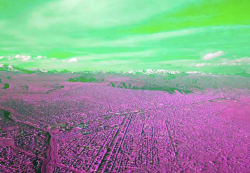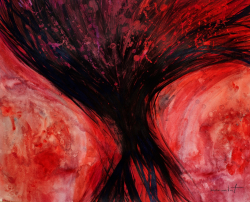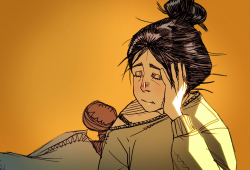
The Elf of Flowers

It's been five years since I quit smoking, but not a single day goes by without me missing tobacco. It's incredible how that foul smell and the gentle movement, the dance of smoke before my eyes, used to inspire me. Upon slight reflection, I realize that I don't necessarily miss the product, but rather the period of my life when I smoked. The cigarette was the best companion for solitude; sitting alone on some steps seemed pathetic, but sitting alone—with a cigarette—was interesting, as if that aroma had a magnetic attraction to mystery and curiosity.
I still remember when Alan Castro approached me while I was killing time; we shared a cigarette, and he mentioned that he preferred Astoria, cheap cigarettes without filters that left a strong fragrance lingering on anything in their path. We talked about music, his girlfriend, mine, books, and any nonsense young people discuss. It was love at first sight, so much so that later that afternoon, he gave me his phone number and invited me to visit his house.
I called him a couple of days later, and he said I could drop by anytime for another chat. I still feel his tone saying, "You can't miss it, little brother; last name Castro, and I live on Cuba Street. Plus, there's a neighborhood store right at the entrance." Indeed, it was easy to find; I took advantage of the neighborhood store to buy some beers to liven up the conversation.
Between ringing the bell and the door opening, easily ten minutes passed; my host had about forty keys of all sizes, and none worked on that gigantic brass door. Besides being large, the door was noisy, and the whole neighborhood knew when someone entered or left. It was right there, at the moment of the customary hug, that I felt a chill down my spine; I had just seen an elf. It was impossible; elves don't exist; however, there was one right there. It disappeared as quickly as it appeared, like a shooting star, not giving me time to even open my mouth. I didn't know how to tell my new friend that it seemed like his house was haunted; in reality, I didn't know how to broach the subject. So, I did what we Bolivians do best: played dumb. "Your house is beautiful, brother, and the location is quite convenient for taking a trufi," a smile, and the matter was closed.
Luckily for me, Alan was in a hurry; he was in the middle of an important phone call. "Wait for me in the living room, old man, I won't be long," he said and rushed inside. Climbing the stairs, I noticed several childish drawings with figures of animals and excited people; they were all very rustic and clearly belonged to different authors. A little higher up, two giant mirrors appeared, facing each other, creating a kind of infinite passage. I vainly tried to see my face reflected infinitely; I could replicate my fingers and shoes a thousand times, but my face remained one.
Finally, I reached a sliding door leading to a living room with a jungle-like atmosphere. Everything was green, from the ceiling to the carpet on the floor; shapes in the room were barely distinguishable. I thought I was in the middle of an olive; even the armchairs seemed made from the same fabric as pool tables. Squinting a bit, I could make out three paintings of felines decorating a dark corner of the room. "This Alan is somewhat fair-skinned and bearded, probably from a family in Beni," I told myself. At that moment, I felt the same cold on my back that the elf had caused, this time laden with fear. I didn't want to turn around to see what it was; I stood still and lit a cigarette with the permission granted by an ashtray on the central table. Turning around, I noticed there was a secret door that moved by itself; I gently pushed it with my foot, and finally, I saw the entire elf. He was adjusting a gold scarf and having lunch with something that looked like a fake rabbit.
Alan almost made me jump out of fear when he appeared from behind and said, "Let me introduce you to my grandpa! He's the number one fan of The Strongest, and he's off to the game in a little while." The elf quickly turned into the mythical "Chupa" Riveros, and, with a firm handshake, he said, "Nice to meet you, young man, have fun, but in a healthy way." I responded with some cordiality, and that world lost all its mystique; the living room stopped being green, and the jungle-like abode gave way to a massive table where we spent hours playing dice, chatting, listening to music, and smoking, until our lungs breathed nothing but tar.
In the midst of our conversation, Alan opened up and was surprised by my complete lack of knowledge about football. I think, before our meeting, his universe was divided into three: those of The Strongest, those of Bolívar, and those of other teams. Now he could create a new group—the one who didn't know anything.
He was quite friendly and told me a thousand stories about his grandpa, how he was the number one fan of his beloved team, how he loved the Bolivian national team, how he went to games with the number one fan of the rival team, how he was a gentleman, a great sportsman, and a great person. I had nothing more to do than listen in silence; after all, it was like Homer talking about Odysseus.
The truth is, the stories were so simple, inspiring, and epic that it was impossible not to love The Strongest. The surprising thing was discovering that what mattered least about the team was football. Winning or losing the games was nothing compared to the weight of literature, anecdotes, and songs that the yellow and black raised.
I still remember that during the celebration of the tricampeonato, in Prado, when the first rays of the sun burned the pupils of the five remaining drunks, a cleaning cart appeared, splashing water and forming a rainbow. I can swear that, from the ground, I saw the elf with a gold scarf and a huge smile at the end of that rainbow. Next to him was a split stone, and I think a crying llama; it was clear that the elf was "Chupa." "Have fun, but in a healthy way," he repeated, and I fell asleep.




